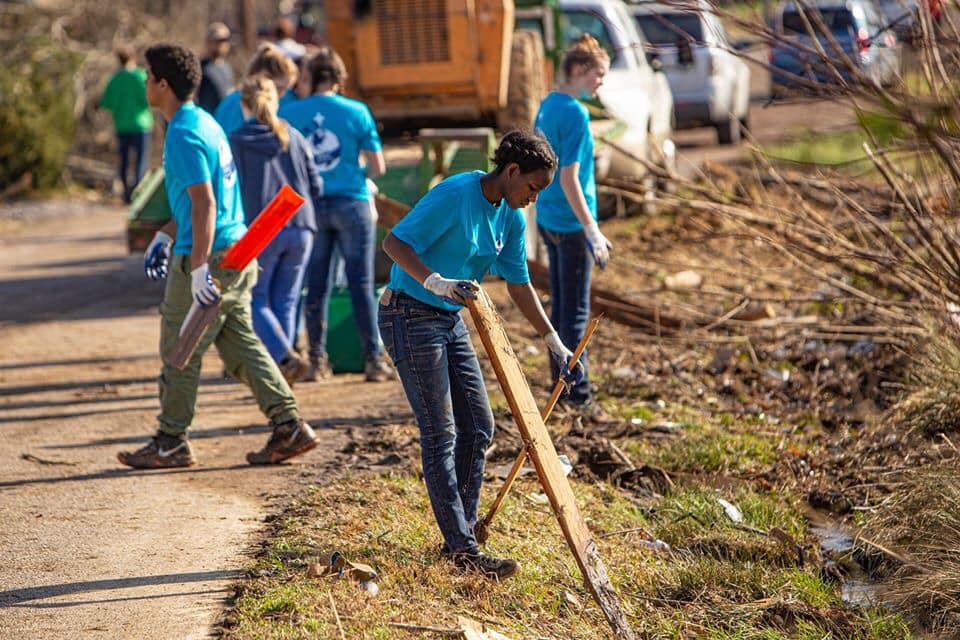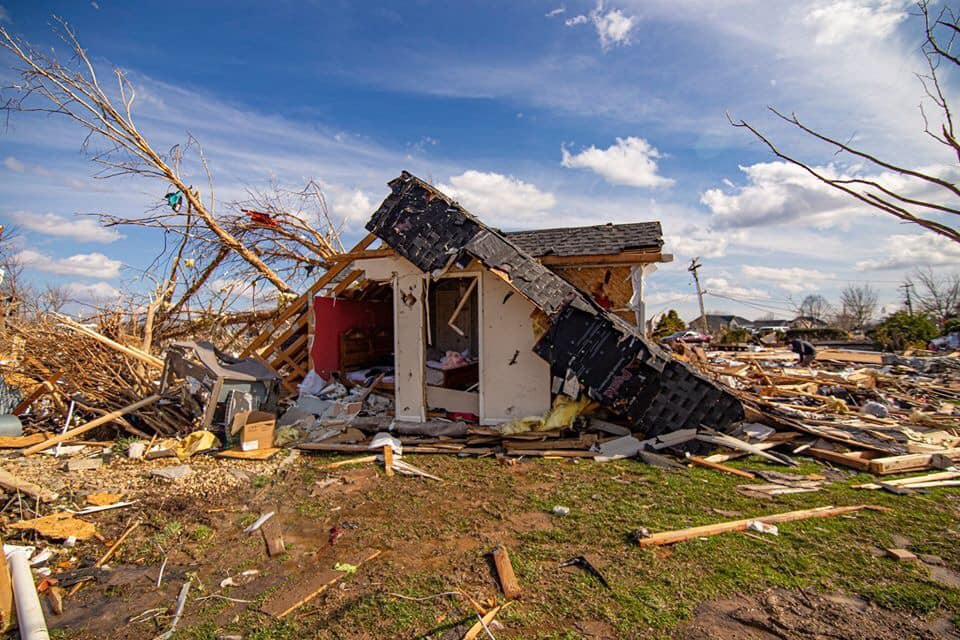Founded in 1994, Heritage Academy is a self-supporting, coeducational, Seventh Day Adventist college-preparatory boarding high school located in Monterey, Tennessee on the Cumberland Plateau in Putnam County. The small school has an active program integrating academic, vocational and spiritual education. Service is a very large part of its institutional fabric in a variety of ways, from mission work to disaster response training.
Heritage Academy has received a $14,800 grant from the Middle Tennessee Emergency Response Fund to provide basic necessities (food, clothing, medications, hygiene needs) to tornado victims at the Cookeville Community Center.
Here’s what high school students at Heritage Academy in scenic Monterey, Tennessee learn beyond the traditional three R’s of education: reading, writing, and arithmetic:
They’re certified in CPR.
They know how to use defibrillator.
They’re trained as part of a Community Emergency Response Team, which is a FEMA program. That involves training others in disaster response as well conducting mock disaster drills.
And when disaster strikes — hurricanes, tornadoes, floods, earthquakes and ice storms — they travel the world over to help those in need.
Since Hurricane Katrina in 2005, Heritage Academy has been deployed to more than 30 natural disasters within the U.S. and internationally and has been involved with more than 20 disaster drills, including with the Harvard University International Symposium.
And when a deadly tornado ripped its way through Putnam County in early March, they didn’t have to travel far to help out — just 15 miles down Interstate 40 heading west to Cookeville, the county seat.
Heritage Academy served as a distribution center for essential supplies, clothing, food and the like for those displaced by the tornado. Contributions arrived from corporations as well as individuals. A steady stream of pickup trucks arriving daily at the center, from throughout the area.
Students helped clear debris throughout the county.
“It was our pleasure to be able to respond to the devastating tornado outbreak on March 3, 2020 in our own backyard,” said Debbie Baker, president of Heritage Academy. “We are blessed to have resources such as a debris removal trailer, shower trailer and training trailer that enables us to deploy using our own resources.”
Disaster response veteran though she is, Baker had never seen anything like this, though.
“The Community Center was designed as a POD (Point of Distribution), and I was asked by the county to run it,” she said. “I have vast experience in POD establishment and management from disasters in New Bern North Carolina; Jacksonville, Florida; Pleasant Grove, Alabama; Monterey, Tennessee; and Panama City, Florida. However, the POD response in Cookeville was an exception. It truly became a lifeline to so many.”
Baker explained the process in those first days:
“Upon registering [at the center], survivors would walk through the community center, where over 500 different items were there for them to take. We trained our volunteers to listen carefully to their stories and to be a sounding board for them. They were invited to take all that they needed, and it was a real effort to convince them.
“Everyone said, ‘I know there are others who need it more than me,’” she continued. “We were constantly reminding them that all of the donations were given specifically for them and to please not deny the giver the satisfaction of giving.
“If our volunteers found that someone needed shelter, had special needs, medical needs, etc., they stopped to see me when they were finished shopping. I had the chance to evaluate what resources we had available (at the center and throughout the county) that could address their loss and fill that void.
“Whether it was a gift card for fuel, a replacement driver’s license, a new cell phone, a grief/trauma counselor, lost pictures or personal effects recovered, a hotel to stay the night, a hot meal, clean clothes, a shower, even a haircut — I had the privilege to share with them where they could go and how they could take advantage of these resources,” Baker said.
“The outpouring of love from all over the country was incredible and was felt by each survivor every time they walked through the doors.”

Baker responded to a few more questions from The Community Foundation recently:
CFMT: How are you using, or planning to utilize, the tornado emergency response grant?
HA: The funding enabled us to replenish our resources, including computers used to track volunteer hours and to document the citizens that were helped. These funds also compensated us for transportation and the resources necessary to sustain an unprecedented response, allowing us to serve our community for over six weeks.”
CFMT: Give a favorite example or two of your staffers or volunteer stepping up to make a difference to help people through these disasters?
HA: One young lady stopped to see me, after going through the center, and told me her story. She couldn’t have been more than 20 years old, but she was taking care of her younger siblings and visiting her mother in the hospital in Chattanooga almost daily. Her entire family had been in the house when the tornado hit and she lost her father and a younger brother, but she had been unable to tell her mother — who was still in a coma — that they were gone.
This young lady was staying with family members, but she was split up from her siblings because there were too many for one home. She needed a place where they all could be reunited to work through their grief together without the trauma of being separated. She also did not have the funds to work on funeral arrangements for her father and brother and felt helpless as they lay at the local funeral home with no concrete plans for a place of rest. She was broken, and I felt consumed with her sadness.
But I was blessed with a battery of resources, including dedicated people who did nothing but find homes for those who were displaced, and contacts who were in touch with local churches and resources to help her with the financial arrangements necessary to bury her family. When she left the Community Center that night, I was relieved that they would all be reunited, and she could begin to put her life back together one step at a time. What a burden she carried, but with Putnam Strong, she was not alone!
We also had a young family that was affected by the storm and living with their in-laws so they were settled but in desperate need of a special type of baby formula. It was so specialized that they couldn’t find it at any grocery store or drug store in the county.
One of our volunteers went through pallets of baby formula until she found exactly what they needed and plenty of it to last them a while. They were so happy — and we offered diapers and wipes for their little one, as well as all the supplies they needed to get back on their feet once they had a new home. The satisfaction of filling those needs put a smile on everyone’s face and our volunteers always went the extra mile to find what was needed. After 10-12 hours on their feet day after day, I never heard a complaint from one of them!
There was a very sweet couple that came to help the first week we were open, Megan and Drew, who had just been married the Sunday before the storm hit. They could have gone on a terrific honeymoon, but they told us that there was no way they could have left their community at such a time of need. They said they could never have been able to enjoy their time together knowing what their neighbors were going through — so they spent their honeymoon at the community center every day!!!! Such self-sacrifice!
CFMT: In light of changes in how we all live and work due to the COVID-19 coronavirus, how is your organization managing to work in supporting tornado relief and recovery efforts? What challenges have you all overcome or are overcoming?
HA: As the country became more and more affected by the spread of the virus, we adjusted our response to reduce contact but still met the needs of the community. We provided a phone number to call in, where survivors could place an order, come to our location and we loaded it up for them. We also were able to deliver to those who could not get out or who were immunocompromised so that their needs continued to be met.
CFMT: In terms of tornado relief and recovery, what needs remain in your community or communities for tornado relief and recovery?
HA: Our community has been hit with a double whammy — the tornado and COVID. Affordable housing and/or housing subsidy would be of great help to so many who have lost their home, apartment, etc., and have lost a job. With so many displaced, housing is so hard to come by.
CFMT: Define the word “hope” for you and your organization.
HA: I think that hope is personified in service. When we give of ourselves, we not only provide hope for those in need, but it bolsters our sense of hope in dire circumstances, both at that moment and in the moments that will come.

Learn More About Heritage Academy
Online at https://heritagetn.org/